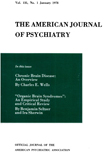The Compleat Forensic Psychiatrist
Abstract
The compleat forensic psychiatrist, as described by the authors, must not only have competence in many areas—pre-trial evaluation, post-trial treatment and follow-up, training, and research—but must be able to communicate his ideas to lay people as well as professionals. To help attract able persons into this field a clear identity and role for the forensic psychiatrist is suggested; eventually an American Academy of Forensic Psychiatrists and Board certification in this subspecialty should be considered.
Access content
To read the fulltext, please use one of the options below to sign in or purchase access.- Personal login
- Institutional Login
- Sign in via OpenAthens
- Register for access
-
Please login/register if you wish to pair your device and check access availability.
Not a subscriber?
PsychiatryOnline subscription options offer access to the DSM-5 library, books, journals, CME, and patient resources. This all-in-one virtual library provides psychiatrists and mental health professionals with key resources for diagnosis, treatment, research, and professional development.
Need more help? PsychiatryOnline Customer Service may be reached by emailing [email protected] or by calling 800-368-5777 (in the U.S.) or 703-907-7322 (outside the U.S.).



